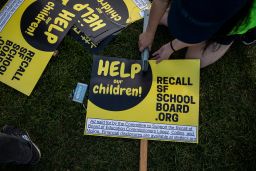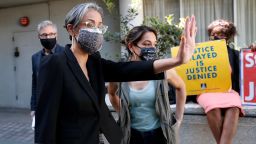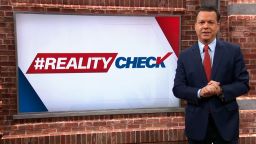The pressures of the coronavirus pandemic are reconfiguring the politics of education, dividing Democrats and creating new openings for Republicans.
Both sides of that equation will be on display Tuesday in a recall election for three school board members in San Francisco, one of the nation’s most liberal cities. The recall, which has split local Democrats, has combined genuine grassroots discontent over extended school closings during the coronavirus outbreak with massive funding from longtime critics of public education and some big supporters of Republican political campaigns. Divisions among Democrats are also sharpening in the accelerating blue state debates about how quickly to lift school mask mandates and other public health restrictions as coronavirus caseloads plummet nationwide.
Yet these internecine struggles between liberals are obscuring a much more expansive and explosive conflict spreading across the red states: an aggressive drive by Republicans to censor how public school teachers talk about race, gender, sexual orientation and other sensitive topics. That effort amounts to the most intrusive attempt to set legislative limits on the specific content of classroom instruction since the spate of state laws barring the teaching of evolution during the 1920s and the anti-Communist loyalty oaths for teachers that proliferated during the Joe McCarthy era after World War II.
Sponsors such as Republican Govs. Glenn Youngkin in Virginia, Ron DeSantis in Florida and Greg Abbott in Texas are advancing these restrictive laws under the banner of “parents’ rights,” attempting to frame them as part of a broader parental demand for greater input after all the uncertainties of school closings and masking and quarantine policies during the long pandemic. Yet many observers, including some critics of how public schools have handled that challenge, say Republicans are trying to divert concerns about safety and student achievement during the pandemic to advance the preexisting goals of culturally conservative, predominantly White parents long resistant to open discussions of race and other controversial topics.
Based on the group’s national polling and meetings with parents all over the country, Keri Rodrigues, co-founder and president of the National Parents Union, says restricting how teachers can talk about race or gender “is really at the bottom of the list” of parental priorities. “This is political opportunism to hijack this momentum we are seeing from parents and families who are panicked and filled with anxiety and concern,” she says.
Results from the latest CNN national poll underscore her perception. While the share of adults who said education would be an important factor in their votes during November’s midterm elections soared past 80%, only about 1 in 4 of them said the content of the curriculum was their major educational concern – and self-identified Republicans were far more likely to do so than other adults. A bigger share of those who said education would be important to them cited more traditional concerns about the broad social benefits of educating the next generation.

“It is a very small percentage of parents and mostly it is White parents in a position of privilege who are leading that conversation” about restricting classroom content, says Rodrigues. “These are the same people who are always hogging the mic … but that is certainly not reflective of the concerns of all parents.”
The pandemic has produced arguably the greatest challenge to the operation of the nation’s public schools since the Civil War. As American Federation of Teachers President Randi Weingarten noted in an interview, schools were able to stay open even during major earlier disruptions to American life, such as the Depression and World War II, but they faced unprecedented questions – and few clear answers – when the pandemic struck. “When did you ever have a situation that we had in March 2020 through June 2020 that schools within a 24-, 48-hour period of time all went remote?” she said.
The pressures of adapting to that sudden new reality – and the long struggle to return to anything approaching normalcy – have imposed enormous strains on everyone connected to the school system, from administrators and teachers to parents and students. And in that crucible, new fault lines have opened in the politics of education.
Parents want schools open
Two years into the pandemic, the clearest note in public opinion may be that parents, and the public more broadly, want schools open for in-person learning wherever possible. In a January NBC national survey, about two-thirds of all adults, and an even higher percentage of parents of children younger than 18, said they were more concerned about kids falling behind academically from not attending school in person than they were about them spreading Covid-19 during in-person instruction. (Black parents were a notable exception, with a slight majority more concerned about spreading Covid, according to detailed results provided by Public Opinion Strategies, a Republican firm that co-manages the survey.)
Frustration over extended school closings was the initial spur for the recall effort against three San Francisco school board members that voters will decide Tuesday. The city kept its schools closed for in-person learning longer than almost any other major jurisdiction.
The San Francisco experience shows how the pandemic has divided Democrats: The city under Democratic Mayor London Breed eventually sued the board – which was engaged in marathon negotiations with the local union over the safety standards for moving teachers back into the classroom – to force it to reopen the schools; Breed has endorsed the recall effort, which some other progressives in the area oppose. Yet the fight also shows how the left’s disagreements about responding to the pandemic have created new openings for longtime critics of public education on the right: Beyond its grassroots support, the recall movement has attracted substantial funding from conservatives, including William Oberndorf, a close ally of former President Donald Trump’s education secretary, Betsy DeVos.
The San Francisco stew is in some respects a miniature of the complex situation nationally: genuine grassroots discontent, Democratic divisions and an aggressive new push from conservatives.
As Republicans like Youngkin and DeSantis rally under the banner of “parents’ rights,” a national CBS poll released Sunday, like earlier surveys, found that many parents are indeed concerned about the impact of the pandemic on their kids’ academic and emotional well-being. But in an Ipsos/Axios poll in November, the vast majority of parents of school-age children praised how their schools have balanced health and academic concerns – a finding that both the National Parents Union and the American Federation of Teachers, which have at times been at odds over the pandemic, say their own private polling has echoed.
Polling also belies the perception of a widespread backlash against mask requirements in the schools. Citing declining caseloads, several Democratic governors have recently announced they will rescind mask requirements in the coming weeks for public school students, joining Republican states that either have already revoked their rules or never set them. (California on Monday reaffirmed its school mask requirement at least through the end of February.) Yet the CBS News poll released Sunday found that nearly three-fifths of parents of school-age children still believe that schools should require masks.
The broadest movement that has emerged from the pandemic’s turmoil is the effort by Republican-led states to censor how teachers talk about present and historic racial and gender inequities. In 2021, nine Republican-controlled states passed such laws and four others imposed restrictions through state boards of education. This year so many proposals have proliferated that Jeffrey Sachs, a political scientist who tracks the laws for the free speech group PEN America, told me his “gut instinct” is that ultimately all 23 states where Republicans hold unified control of the governorship and state legislature will approve some version of these measures.
Parents’ concerns? Achievement and safety
These proposals are not only expanding to more states but also broadening in their reach. In a news briefing on Monday, PEN America said eight states this year are considering legislation that would limit (or fully prohibit) how teachers and schools talk about sexual orientation and gender identity – with the most prominent of those efforts the legislation advancing in Florida that critics have dubbed the “don’t say gay” bill. Other states are proposing to impose greater surveillance on teachers, such as the Iowa bill that would install video feeds in every classroom. Youngkin has established a “tip line” allowing parents or others to charge teachers with improperly addressing “divisive” topics. Book bans are spreading across red states and school districts as well.
Adapting the tactic employed in Texas’ new anti-abortion law, the Florida bills limiting how teachers can talk about race or sexual orientation would authorize private lawsuits by parents against schools. These measures threaten “to turn Florida into a censorship and surveillance state,” Nadine Smith, executive director of Equality Florida, an LGBTQ rights group, charged in the PEN briefing.
DeSantis, who along with Abbott has been among the most visible advocates of these restrictive laws, has defended them as a way of ensuring parental input into the curriculum. “You have politicians saying parents have no role in the education of their kids. Give me a break,” DeSantis said last week while embracing the “don’t say gay” legislation. “We want parents to be able to have access to what’s going on in the classroom.”
Yet polling suggests that the demands for restrictions on how schools address race, gender, sexual orientation and other controversial subjects are preponderantly a concern of one group of parents: Republicans. In last week’s national CNN survey, only about 1 in 6 adults thought parents should have the principal say on how schools teach race and only about 1 in 8 thought they should have the most influence either on how history is taught or which books are allowed in school libraries. Big majorities instead thought that authority should be shared among parents, teachers and school officials. Republicans were much more likely than others to argue that parents should have decisive authority, but even among GOP partisans that was a minority position.
Sponsors of the laws limiting the teaching of racism tout them as a means of defusing racial conflict. Reihan Salam, president of the Manhattan Institute, a conservative think tank that has been among the most ardent promoters of these proposals, recently argued that they will promote greater racial harmony. “If we’re going to build a successful multiethnic democracy, it’ll be because we’ve lowered the salience of race in people’s lives,” he recently declared.
But critics of these plans see in them precisely the opposite goal: to suppress the social and political influence of historically marginalized groups that are growing in numbers. These bills to restrict how schools discuss race or sexual orientation are coming precisely as the 2020 census found that kids of color, for the first time, constitute a majority of the under-18 population, and a 2021 Gallup Poll found a far larger percentage of Generation Z (nearly 1 in 6) identifying as part of the LGBTQ community than people in older generations. “They are attacking any place where they can see the diversity rise,” George Johnson, author of “All Boys Aren’t Blue,” his 2020 memoir as a gay Black man, which has been banned from school libraries in multiple states, said Monday on the PEN briefing call.
Critics of these proposals like Ruthanne Buck, a senior adviser to the Campaign for Our Shared Future, a group opposing them, see proponents operating a kind of “bait and switch” with parents. Focus groups with parents across the ideological spectrum, she says, show the pandemic has in fact exacerbated frustration with the quality of public education. “The general feeling is that Covid was a final straw to an educational system that was already struggling,” she says.
But, echoing the results of the CNN poll, she says those concerns are centered not on whether students are learning too much about controversial subjects, but on academic achievement, the quality of communication between schools and parents, maintaining safety amid the persisting pandemic, and mental health supports for children.
“Across the board, parents do not think state legislators should be passing laws telling public schools what they can and cannot teach,” Buck says. “They think decisions about education should be left to school boards, parents and teachers. … We asked what’s the most important thing to you as a parent, and across the board, it was kids being able to think for themselves, show respect for others, think critically.”
Pandemic unleashed frustrations over schools
Weingarten, the American Federation of Teachers president, similarly argues that parents, especially after watching their children learn at the kitchen table during the pandemic’s many months of remote instruction, are legitimately displaying more interest in school curriculums.
“Of course, parents have a role,” she says. But she argues that “there’s a big difference between a gotcha proposal, without any kind of due process, without any kind of guardrails,” such as establishing a tip line for complaints about teachers, and measures that can instill more genuine cooperation, such as “having open school nights where parents are talking to teachers … about curriculum.”
Weingarten argues that the goal of the bills restricting the teaching of race or sexual orientation is to “chill” classroom discussions of the underlying changes in American society. She likens the wave of restrictions to the measures that Southern states passed in the 1920s barring the teaching of evolution and the requirements for teachers to swear loyalty oaths and avoid teaching critical of the US government during the “red scare” years after World War II.
“We are really backsliding,” she says. “The exploitation of fear in the aftermath of Covid is being used to try to turn the clock back to the 1950s in this country.”
Rodrigues largely agrees with that part of Weingarten’s analysis. The proliferating red state restrictions on teaching “are creating a toxic environment for Black and brown children in this country,” she says. But she also says it is a mistake for Democrats and union leaders to ignore the other side of the equation: that a significant number of parents are concerned about the education system’s quality after getting a closer look at it during the pandemic.
“We had this catastrophic failure of our public education system: They were not ready, they were not prepared for this moment and parents had to scramble,” Rodrigues says. “We went to the promised land of choices and options … and now that we have been there, you can’t put that toothpaste back in the tube.”
Will Marshall, founder and president of the Progressive Policy Institute, a centrist Democratic think tank long critical of teachers’ unions, sees the same dual-edged message for Democrats in the broadening conflicts over education.
“Republicans are tapping into frustrations real and imagined, but we have left a vacuum,” he says. “We have no reform agenda. Our party is seen as propping up a bureaucratic status quo that many parents thought didn’t perform well during the pandemic. You can’t just point to Republican demagoguery about race and books and win the argument. You have to make voters a counteroffer.”
President Joe Biden’s administration has not set a sharply defined course through these swirling waters. It has consistently advocated for schools to reopen (and won the funding of substantial federal spending to support that), but it has neither identified with the centrist Democrats like Marshall advocating for school reforms to improve student performance nor consistently opposed the restrictions on teaching that are exploding in the red states. (Biden has directly criticized Florida’s “don’t say gay” bill.)
Staying mostly on the sidelines may grow less plausible for the President as the education wars escalate from coast to coast – from the intramural liberal conflict on display Tuesday in San Francisco to the battle between DeSantis and his GOP allies with free speech and LGBTQ rights advocates in Florida. In Covid’s turbulent wake, schools almost everywhere are moving to the front lines of the volatile struggle between what America has been and what it is becoming.




